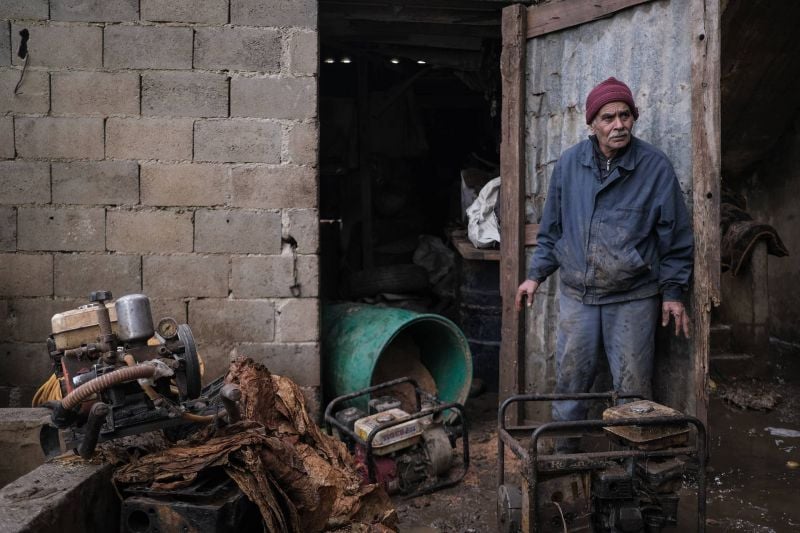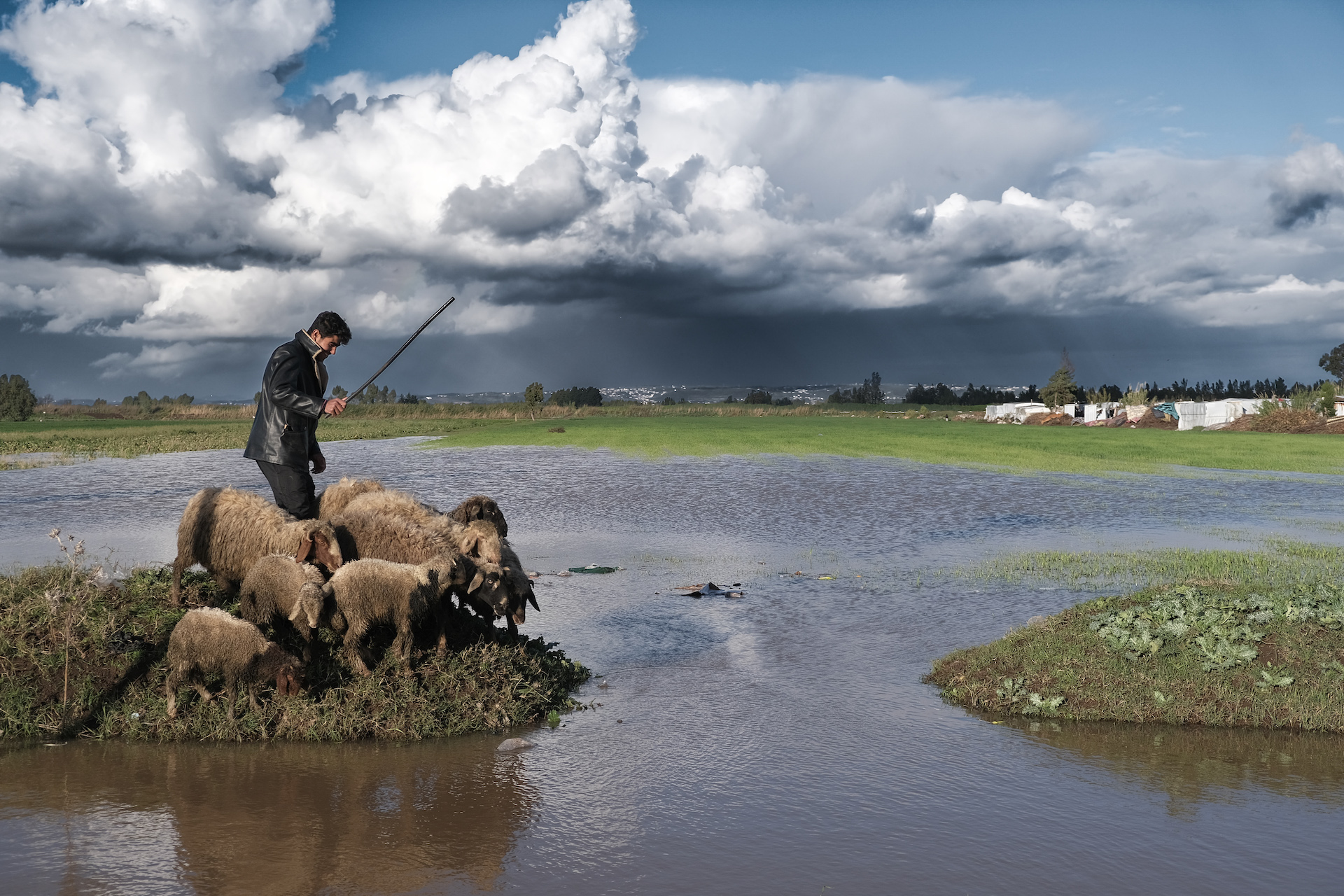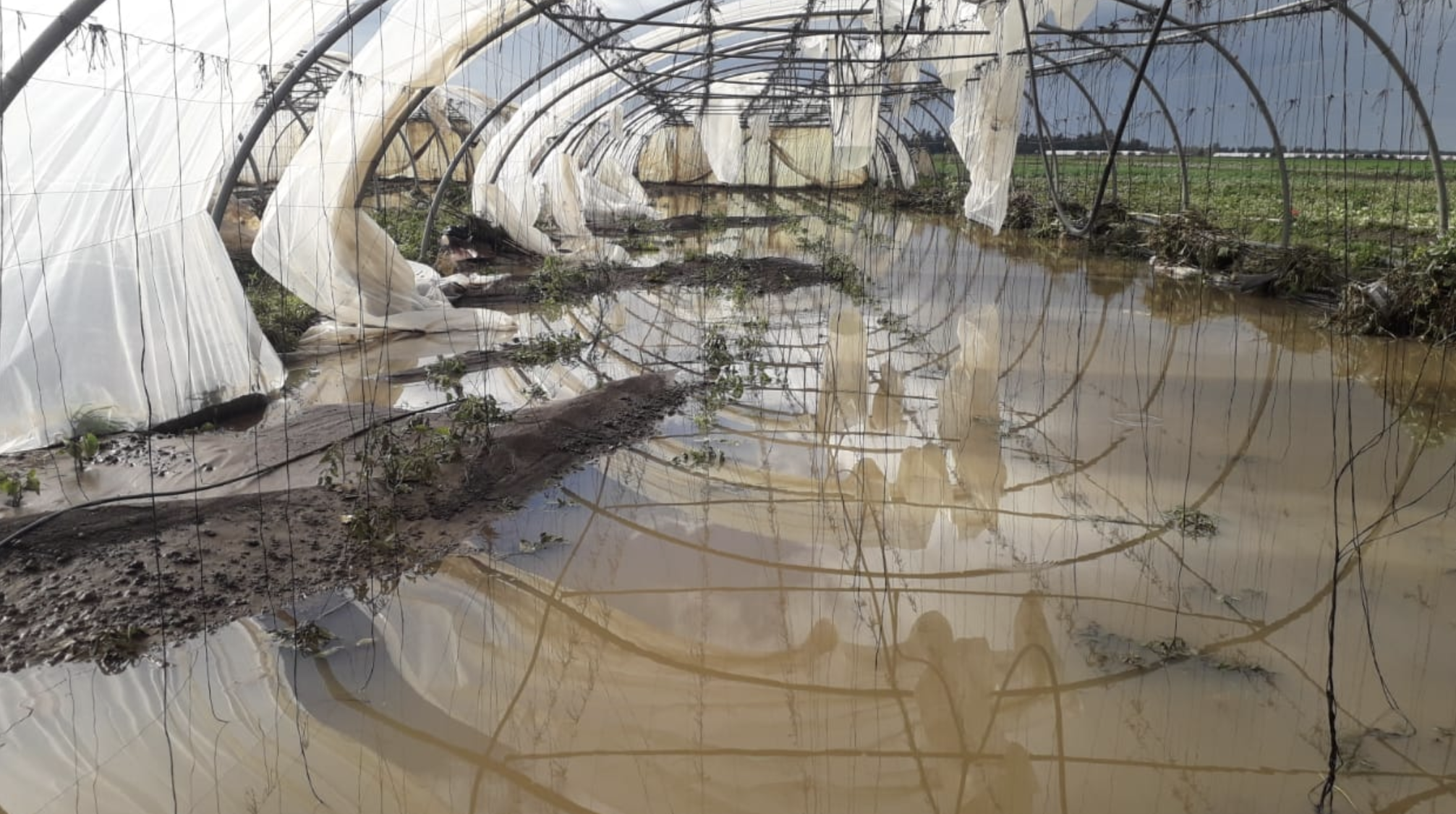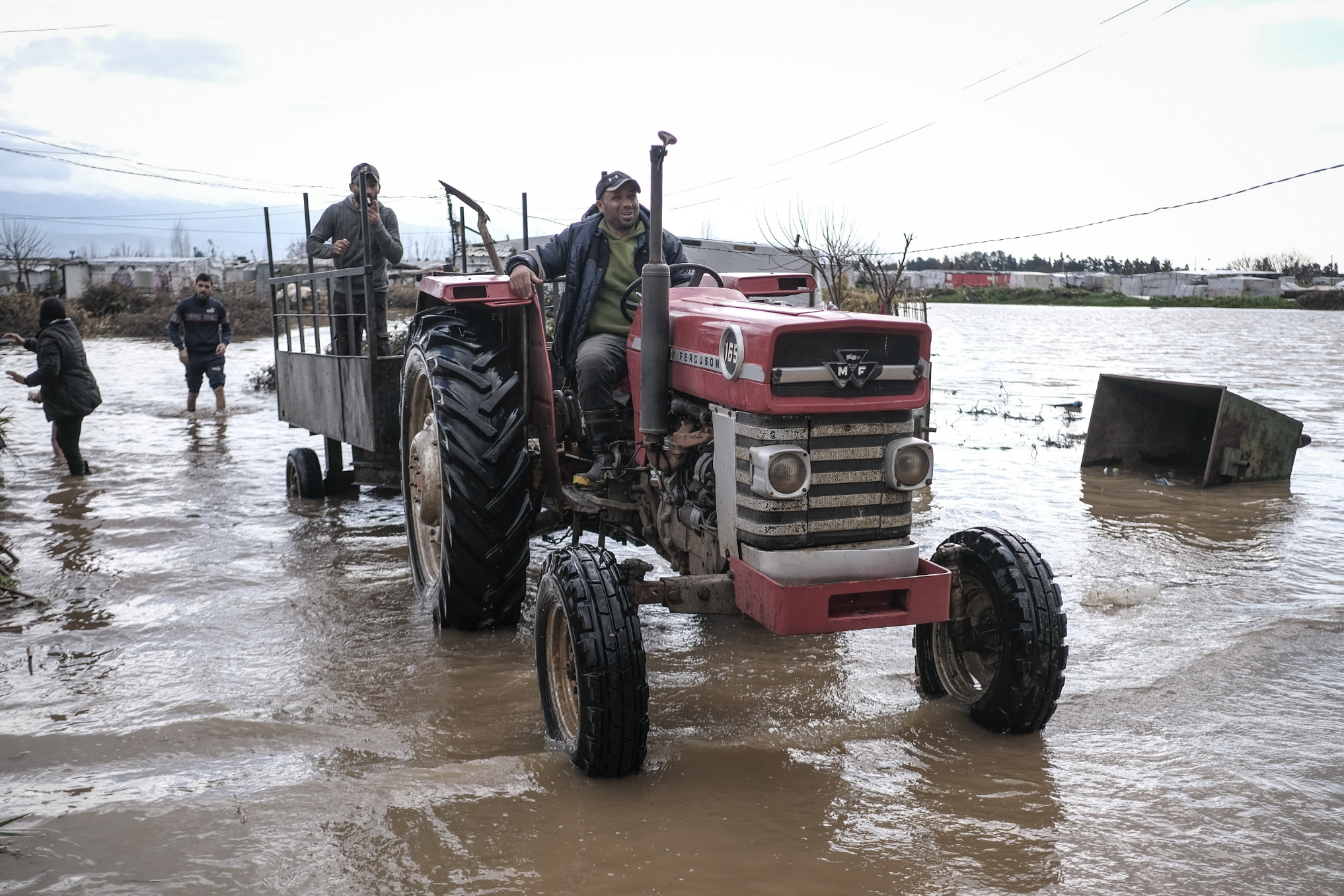
Abdel Razzak Chakra, a tobacco farmer from Summaqieh (Akkar), laments the loss of dozens of sheep in the climate catastrophe. (Credit: João Sousa/L'Orient Today)
The images of plains flooded by more than a meter of muddy water in Akkar, after the storm that broke out during the week of Jan. 8, demonstrate the extent of the damage to the Lebanese agricultural sector.
This northern region was not the only one to suffer from the extreme rainfall. Other plains in the Bekaa, notably Qubb Elias and Ammiq, as well as citrus and banana fields in south Lebanon were also affected, albeit to a lesser extent.
“The most affected crops are greenhouse vegetables and herbs, as well as potatoes consumed from spring onwards,” explained Antoine Hoayek, President of the Lebanese Farmers' Association. He pointed out that the region most affected is Akkar, due to the overflowing of the al-Kabir river, which crosses the border with Syria.
“Akkar is a major supplier of food in this season,” he added. The consequences are therefore serious for farmers, but also for consumers. “We're going to see shortages and higher prices because we're going to have to import larger quantities,” he stressed. According to Hoayek, it is still too early to estimate the area decimated or quantify the losses.
 A shepherd guides his flock through floodwater in an informal Syrian refugee camp on the outskirts of the village of Summaqieh, on the border with Syria. Jan. 15, 2024. (Credit: João Sousa/L’Orient Today)
A shepherd guides his flock through floodwater in an informal Syrian refugee camp on the outskirts of the village of Summaqieh, on the border with Syria. Jan. 15, 2024. (Credit: João Sousa/L’Orient Today)
The Ministry of Agriculture said that 2,000 dunums (one dunum is equivalent to 1,000 m²) of wheat, oats, strawberries and tomatoes, as well as at least 200 greenhouses, were devastated in Wadi Khaled (Akkar) alone. The ministry added that in Akkar, like elsewhere, herds also fell victim to the floods and cold, as did beehives and fish farms.
‘The worst thing is the months of lost work’
“All the farmers here have lost 80-100% of their crops,” lamented Hassan Safi, a farmer from Massoudiyeh in Akkar, who owns over 60 hectares of land. “The land is so muddy that we still can't get in after last week's rains,” he said. He doesn't expect to be able to salvage anything from his vegetable and herb crops, or even from the potatoes that are planted this season and harvested in the spring.
“I can't estimate my losses at the moment. All I can tell you is that I've got almost nothing left. What's worse are the months of lost work, and the creditors who will soon be knocking on my door, and whom I won't be able to pay,” Safi added.
For him, as for all the other farmers in the region, planting anything this season is out of the question, because in spring and summer, competition with produce from the Bekaa will be too strong.
The herds have also suffered from the floods. Abdel Razzak Chakra, a tobacco farmer from Summaqieh (Akkar) who met with our journalist Madeline Edwards on Monday, said he had not only lost almost all his stored tobacco, but also 45 of his 250 sheep. Around 50 are now sick and may not survive.
“I've got nothing left,” he said.
Further south, it was mainly the wind that caused many citrus trees to fall. But the situation is nowhere near as apocalyptic as in Akkar.
“Our real problem is the blockage of exports, particularly to the Gulf countries, for political reasons [an embargo on Lebanese agricultural exports to the Gulf countries has been in force for several years].”
“If there have been major losses of citrus fruit, blown off the trees by the wind during this storm, it's because the prices are too low, discouraging farmers from harvesting their fruit,” said Ramez Osseirane, President of the Southern Farmers' Cooperative.
He added that farmers in the south are already suffering the consequences of the war between Hezbollah and Israel in the region.
No money yet
As with every disaster, farmers are at a loss for words when it comes to denouncing the inaction of the authorities, both upstream and downstream.
“Each time, we are sent teams to carry out censuses, and we never hear from them again. This time, we're going to chase them away,” insisted Safi.
The Farmers' Association plans to issue a strongly worded statement in the next few days, denouncing the absence of the authorities in a country plagued by corruption and economic crisis.
“We don't even waste our time demanding compensation anymore, because either there's no money, or foreign aid never reaches the recipients,” said Hoayek.
Asked about possible compensation for farmers, outgoing Minister of Agriculture Abbas Hajj Hassan told L'Orient-Le Jour that he “immediately sent officials to survey the damage in Akkar and other regions.”
“I am in contact with the head of the High Relief Committee, General Mohammad Kheir, whose responsibility is to compensate the victims, and he has sent his own team to the field,” continued Hajj Hassan. The issue will have to be raised at the next Council of Ministers, he said, so that funds can be released for compensation.
But farmers often complain that the authorities fail to act on their demands: “This is unfortunately true; a census carried out following last year's floods in Akkar did not result in any compensation,” admitted the minister.
“And I can tell you quite frankly that there is no money to compensate these farmers quickly. But the census is a way of preserving their rights. For my part, I want to raise this matter in the Council of Ministers so that action can be taken to collect this money, whether it comes from aid provided by a foreign organization or from state coffers. I promise to follow this matter through to the end,” he added.
 A greenhouse completely destroyed by flooding in Akkar. (Credit: Hassan Safi)
A greenhouse completely destroyed by flooding in Akkar. (Credit: Hassan Safi)
Compensation after the fact is not the only demand for farmers. Safi pointed out that the al-Kabir river regularly overflows its banks, and that all that's needed is to clean it up before the rainy season and build a protection wall high enough on the banks to protect the fields “as has been done on the Syrian side.”
A solution to which Hajj Hassan responded, "it's not that simple to build this wall, there are obstacles linked to the lack of resources on the part of the state, and others that are more technical. A more detailed study is needed to determine whether it is technically feasible and whether expropriation is necessary.”
A dormant law since 2005
With the Lebanese state in bankruptcy, Hoayek asserted that the lasting solution to the problems of agricultural losses due to climate and disasters lies elsewhere than with politicians.
“Since 2005, a draft law on farm insurance has been before parliament. This text has already been examined by the various committees and is still awaiting adoption by the assembly,” he said.
 Farmers have lost everything in these floods: Their crops, their equipment and months of work. This is an example in Akkar. (Credit: João Sousa/L'Orient Today)
Farmers have lost everything in these floods: Their crops, their equipment and months of work. This is an example in Akkar. (Credit: João Sousa/L'Orient Today)
According to him, this law includes all the necessary provisions to ensure compensation for farmers in the event of disasters, in return for a premium paid by the farmers themselves and a portion by the state.
“We lobbied all the parliamentary blocs, and they were unanimously in favor of this law, yet it still hasn't been passed,” he lamented.
The reasons for this, he believes, lie mainly in clientelism.
“If farmers could obtain compensation after a disaster of this type, they would no longer need to turn to the MP for their region to beg for their entitlement, before listening to lies and finding themselves just as destitute as they were at the outset,” stated the trade unionist.
This article was originally published in L'Orient-Le Jour. Translated and edited by Yara Malka.
